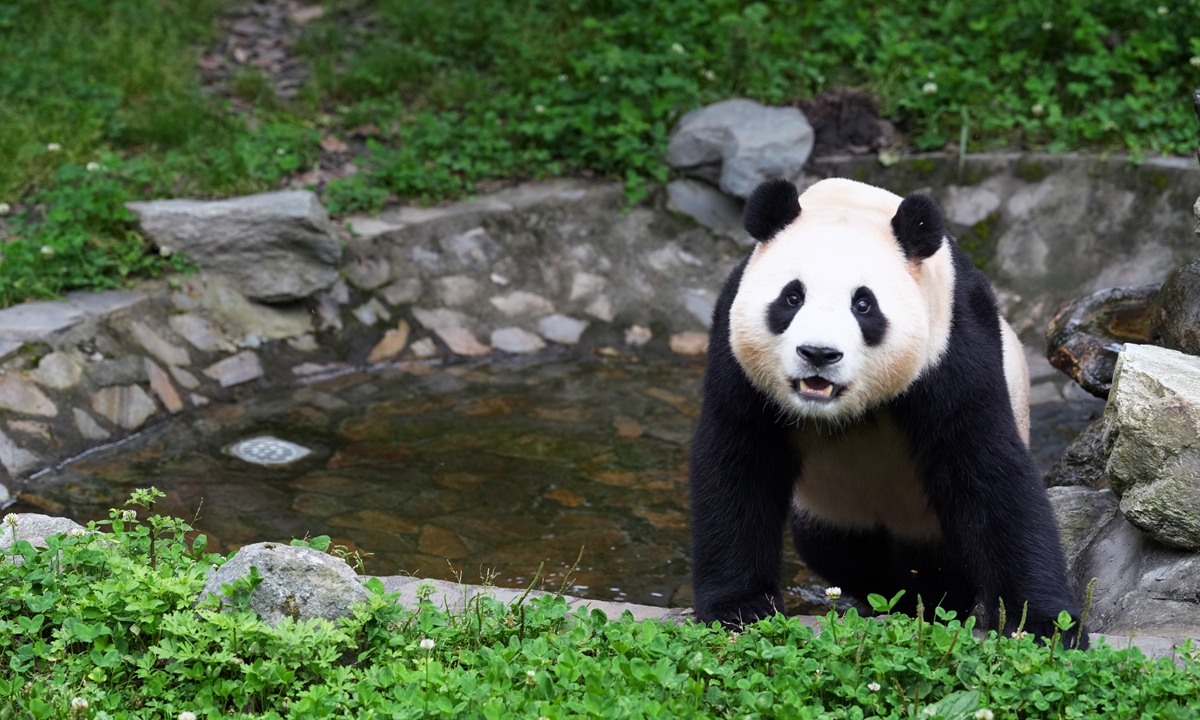Fu Bao's debut a 'positive response' to refute rumors
Beloved S.Korea-born giant panda meets the public in Sichuan

The beloved giant panda Fu Bao meets the public for the first time in the Shenshuping giant panda base of Wolong National Nature Reserve on June 12, 2024 after returning to China from South Korea about two months ago. Photo: VCG
The beloved giant panda Fu Bao met the public for the first time in the Shenshuping giant panda base of Wolong National Nature Reserve on Wednesday after returning to China from South Korea about two months ago. An expert noted that Fu Bao's public debut is a positive response to refute the rumors on overseas social media claiming that the giant panda star was "mistreated" in China.
At around 9 am, more than 40 student fans and multiple media outlets were waiting for Fu Bao to make an appearance at the base in Southwest China's Sichuan Province, according to the China Conservation and Research Center for Giant Panda.
After the small gate leading to the outdoor playground opened, Fu Bao slowly walked out from the shelter and curiously looked around, and sniffed in the new yard. The giant panda explored the area, lightly smelling the flowers, bamboo and carrots specially prepared by the keepers for her. Later, Fu Bao started to enjoy her food.
The China Conservation and Research Center for Giant Panda also conducted an online live-streaming for fans to virtually meet Fu Bao through its official Sina Weibo account. As of Wednesday morning, its live-streaming has gained more than 11 million views.
Starting from Wednesday, crowd control and time limits will be implemented at the base, with each round of visit to Fu Bao lasting five minutes, according to the conservation and research center.
Fu Bao is the epitome of the cooperation and exchange between China and South Korea. Fu Bao is the first giant panda that was born in South Korea to Le Bao and Ai Bao, the pandas leased by China to the country in 2016. She quickly became an online star among netizens in South Korea after her birth.
"I'm watching Fu Bao's debut on live streaming. Fu Bao looks healthy. She takes two bamboos in each hand, and is lying on the shelter and eating them," one netizen wrote via X on Wednesday, who posted a live-streaming link by South Korean broadcaster SBS.
However, there were still rumors claiming that Fu Bao was allegedly "abused" in the Chinese base, sparking a movement to "save Fubao" and "return Fubao" on overseas social media platforms. In response, the giant panda conservation and protection center has released several videos to refute the rumors that "Fu Bao lives in a poor environment."
Fu Bao's debut at the base is a "positive response" to refute the rumors, showing the public the truth of the situation, Da Zhigang, director of the Institute of Northeast Asian Studies at Heilongjiang Provincial Academy of Social Sciences, told the Global Times on Wednesday.
Giant pandas have played an important role as a bridge in promoting friendly exchanges between China and South Korea, said Da. The love for giant pandas by South Korean netizens should be shown in a friendly and rational manner, rather than being influenced by misinformation or emotions, Da noted.
It should not be associated with other politicized interpretations, and should be addressed through active responses and communication, Da said. It is expected to enhance deepened cooperation in other sectors such as tourism, culture, animation and digitalization fields, according to Da.
Since 1996, the China Conservation and Research Center for Giant Panda has been carrying out international cooperation on giant panda conservation, collaborating with organizations from countries and regions including the US and Russia, and successfully breeding 31 giant panda cubs. Among them, 23 cubs have returned to China. As of now, there are 32 giant pandas residing overseas, said the conservation and research center.


